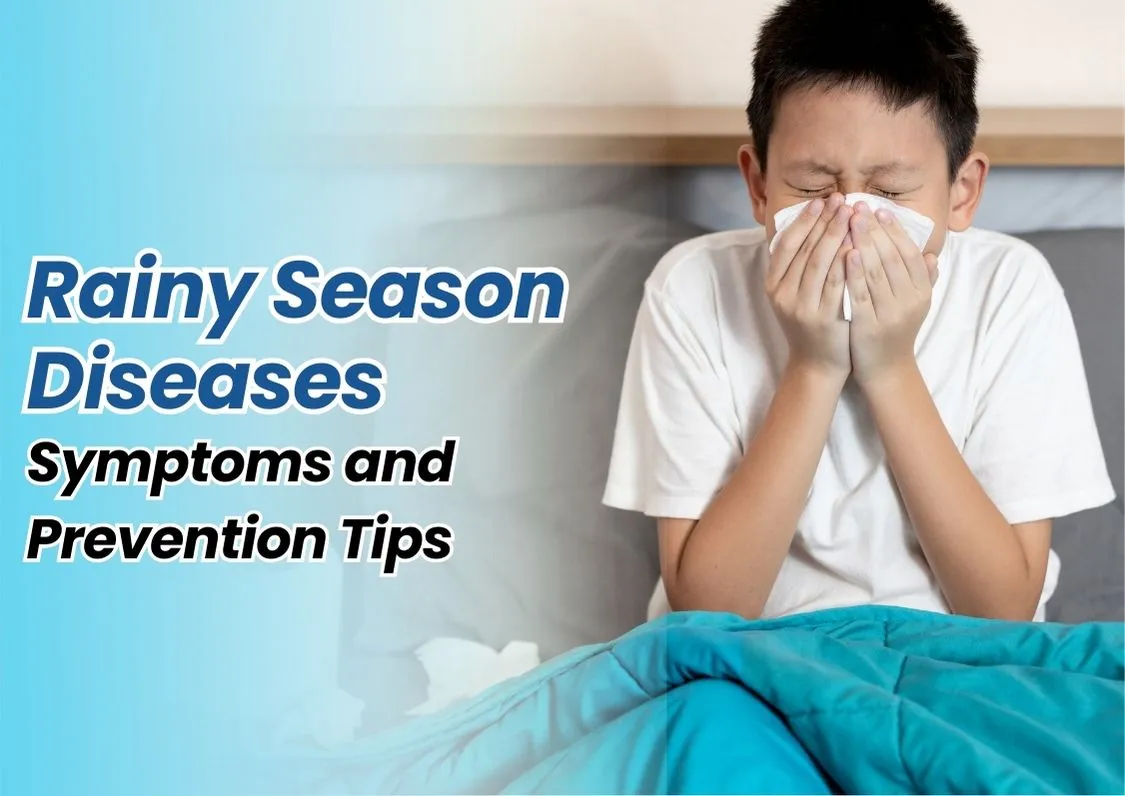Rainy Season Diseases: Symptoms and Prevention Tips
Summary
When the rainy season rolls in, it feels like nature’s own celebration, with raindrops tapping on windows and plants turning vibrant green. This change in weather gives a refreshing break from the hot summer days. However, the rain also brings some challenges. As the extra moisture can lead to the spread of certain diseases. Fever in the rainy season is one of the most common diseases. In this blog post, we will explore the rainy season diseases, their symptoms, and preventive tips to help you stay healthy and enjoy the rainy season happily.
1. Dengue Fever:
It is a viral infection transmitted by the Aedes mosquito, causing high fever, severe headaches, and joint pain.
Dengue Symptoms
-
High Fever: Sudden onset of high fever.
-
Severe Headache: Severe headache, especially behind the eyes.
-
Joint and Muscle Pain: Usually referred to as "breakbone fever" due to severe pain.
-
Rash: Skin rash that appears a few days after the fever starts.
-
Nausea and Vomiting: Feeling nauseous and frequent vomiting.
-
Fatigue: Excessive tiredness and exhaustion.
-
Bleeding: Minor bleeding from gums or nose.
Prevention Tips
-
Eliminate Mosquito Breeding Sites: Regularly empty containers with standing water, such as pots, buckets, and vases.
-
Use Mosquito Repellents: Apply insect repellent to exposed skin and clothing, especially when outdoors.
-
Install Screens: Put up screens on windows and doors to stop mosquitoes from coming inside.
-
Wear Protective Clothing: Wear long-sleeved shirts and pants when you go outside to protect yourself from mosquito bites.
-
Use Mosquito Nets: Sleep under a mosquito net, especially in areas with high mosquito populations.
"Dengue can become dangerous if not managed early. Watch for warning signs like persistent vomiting, severe abdominal pain, or bleeding. Hydration is key in dengue management; patients must drink plenty of fluids," says Dr. Ajay Kaushik, renowned Internal Medicine doctor, Miracles Healthcare Gurgaon.
2. Malaria:
Malaria is a serious disease caused by Plasmodium parasites, spread to humans through the bite of infected Anopheles mosquitoes.
Malaria Symptoms
-
Fever and Chills: Recurrent attacks of fever and chills.
-
Sweats: Profuse sweating as the fever subsides.
-
Headache: Intense headache that can be persistent.
-
Muscle and Joint Pain: Severe aches and pains throughout the body.
-
Nausea and Vomiting: Feeling sick and frequent vomiting.
-
Fatigue: Constant tiredness and weakness.
-
Anemia: Caused by the parasite destroying red blood cells, leading to low hemoglobin levels.
Prevention Tips
-
Antimalarial Medication: Take prescribed antimalarial medications if traveling to high-risk areas.
-
Mosquito Control: Use insect repellent and mosquito nets, and keep living areas mosquito-free.
-
Indoor Residual Spraying: Apply insecticides on walls and surfaces where mosquitoes rest.
-
Environmental Management: Drain stagnant water sources around homes and communities.
3. Leptospirosis:
It is a bacterial infection transmitted through water contaminated with the urine of infected animals, usually after contact with floodwaters.
Leptospirosis Symptoms
-
Fever: High fever that can be accompanied by chills.
-
Muscle Aches: Severe muscle pain, particularly in the calf muscles.
-
Headache: Intense headache that can persist for days.
-
Red Eyes: Eyes may appear red and irritated.
-
Jaundice: In severe cases, the skin and eyes can turn yellow due to liver involvement.
-
Vomiting and Diarrhea: Nausea, vomiting, and diarrhea can occur.
-
Rash: A rash may develop in some cases.
Prevention Tips
-
Avoid Contaminated Water: Avoid wading in floodwaters or swimming in contaminated water bodies.
-
Wear Protective Clothing: Use waterproof boots and gloves if contact with contaminated water is unavoidable.
-
Rodent Control: Implement measures to control rodent populations around the home.
-
Clean Surroundings: Keep the environment clean and free of garbage to deter rodents.
3. Chikungunya:
It is a mosquito-borne viral illness that causes sudden high fever and severe joint and muscle pain.
Chikungunya Symptoms
-
Fever: Sudden onset of high fever.
-
Joint Pain: Severe joint pain, often in the hands and feet.
-
Muscle Pain: General muscle aches and discomfort.
-
Headache: A Constant headache that accompanies fever.
-
Rash: A rash may develop on the skin.
-
Fatigue: Extreme tiredness and weakness.
-
Swelling: Swelling around joints.
Prevention Tips
-
Mosquito Control: Eliminate mosquito breeding sites and use repellents.
-
Protective Clothing: Wear long-sleeved shirts and pants to minimize skin exposure to mosquitoes.
-
Screens and Nets: Use window screens and sleep under mosquito nets.
-
Community Action: Engage in community clean-up campaigns to remove breeding sites.
4. Typhoid Fever
It is a bacterial infection spread through contaminated food and water, leading to prolonged fever and abdominal pain.
Typhoid Fever Symptoms
-
Fever: Slowly increasing fever that can become very high.
-
Weakness: General feeling of weakness and fatigue.
-
Stomach Pain: Abdominal pain or discomfort.
-
Headache: Constant headache.
-
Loss of Appetite: Reduced desire to eat.
-
Diarrhea or Constipation: Sudden changes in bowel habits, including diarrhea or constipation.
-
Rash: Flat, rose-colored spots on the abdomen.
Prevention Tips
-
Drink Safe Water: Always boil water or use a purifier to make sure it is safe to drink.
-
Hygiene Practices: Wash hands thoroughly before eating and after using the restroom.
-
Food Safety: Eat freshly prepared food and avoid raw or undercooked items.
-
Vaccination: Get vaccinated against typhoid if traveling to high-risk areas.
5. Viral Infections (Common Cold and Influenza):
The common cold and flu are contagious respiratory infections that tend to spread more during the rainy season.
Viral Infections (Common Cold and Influenza) Symptoms
-
Cough and Cold: Continuous cough and runny nose.
-
Sore Throat: Pain as well as irritation in the throat.
-
Fever: Mild to moderate fever.
-
Body Aches: General aches and pains throughout the body.
-
Fatigue: Feeling tired and lacking energy.
-
Headache: Mild to severe headache.
Prevention Tips
-
Good Hygiene: Wash hands regularly with soap and water.
-
Avoid Crowded Places: Stay away from crowded areas to reduce the risk of infection.
-
Boost Immunity: Eat a well-balanced diet rich in vitamins and minerals to strengthen the immune system.
-
Stay Hydrated: Drink plenty of fluids, including water, coconut water, and fresh juice, to stay hydrated.
-
Vaccination: Consider getting vaccinated against the flu.
6. Gastroenteritis:
This is an inflammation of the stomach and intestines, often caused by viruses or bacteria, leading to diarrhea and vomiting.
Gastroenteritis Symptoms
-
Diarrhea: Frequent, watery bowel movements.
-
Vomiting: Nausea and frequent vomiting.
-
Stomach Cramps: Abdominal pain and cramping.
-
Fever: Low-grade fever in some cases.
-
Dehydration: Risk of dehydration due to fluid loss.
Prevention Tips
-
Safe Food and Water: Consume only safe, clean food and water.
-
Hand Hygiene: Wash hands thoroughly before eating and after using the bathroom.
-
Avoid Street Food: Avoid eating street food; choose clean places to eat.
-
Boil Water: Boil water before drinking if its safety is uncertain.
General Tips for Staying Healthy During the Rainy Season
1. Boost Your Immunity
-
Eat a Balanced Diet: Eat a well-balanced diet rich in vitamins and minerals to boost the immune system.
-
Stay Hydrated: Drink at least 7-8 glasses of water to keep your body hydrated.
-
Get Enough Sleep: Aim for 7-8 hours of sleep to support your immune system.
-
Exercise Regularly: Engage in moderate physical activity to maintain overall health.
2. Maintain Personal Hygiene
-
Frequent Handwashing: Wash your hands often with soap and water, especially before eating and after using the toilet.
-
Use Hand Sanitizer: Carry a hand sanitizer for times when soap and water are not available.
-
Cough and Sneeze Safely: Always use a tissue or your elbow to cover your mouth and nose.
3. Keep Your Environment Clean
-
Dispose of Waste Properly: Throw garbage in closed bins to keep insects and pests away.
-
Drain Stagnant Water: Regularly check and drain water from pots, tires, and other containers.
-
Clean Living Spaces: Keep your home clean and free of clutter to minimize the risk of disease.
4. Wear Appropriate Clothing
-
Rain Gear: Use umbrellas, raincoats, and waterproof boots to stay dry during rain.
-
Warm Clothing: Wear warm clothing if temperatures drop to prevent colds.
-
Stay Informed
-
Weather Updates: Keep track of weather forecasts and plan activities accordingly.
-
Health Alerts: Be aware of any health advisories or alerts in your area.
-
See the Doctor: If you are feeling under the weather with persistent symptoms, don't hesitate to consult a general physician near you for the right diagnosis and treatment.
By following these easy tips, you can enjoy the beauty of the rainy season while keeping yourself and your family healthy and safe. Stay prepared, stay informed, and make the most of this refreshing time of year!
Conclusion:
The rainy season is a beautiful time, but it also brings the risk of getting sick. By learning about the common rainy season diseases and how to prevent them, you can stay healthy and enjoy the rain without worry. Remember to practice good hygiene, keep your surroundings clean, and be prepared with the right tools and knowledge. Take action today by sharing these tips with your friends and family. Let's work together to keep everyone healthy during the rainy season! If you or your loved ones experience any symptoms of monsoon-related illness, consult a general physician near you for expert diagnosis and care.
Frequently Asked Questions
Maintaining hygiene, avoiding street food, drinking clean water, and boosting immunity with a balanced diet.
Dengue, malaria, typhoid, leptospirosis, cholera, viral fever, flu, hepatitis A, stomach infections, and skin allergies.
Wear dry clothes, avoid walking in stagnant water, eat freshly cooked food, and stay hydrated.
Carry an umbrella or raincoat, change out of wet clothes quickly, and take a warm shower if drenched.
Miracles Healthcare is one of the best hospitals in Gurgaon for diagnosing and treating monsoon-related illnesses.














Was the information useful?
0 0